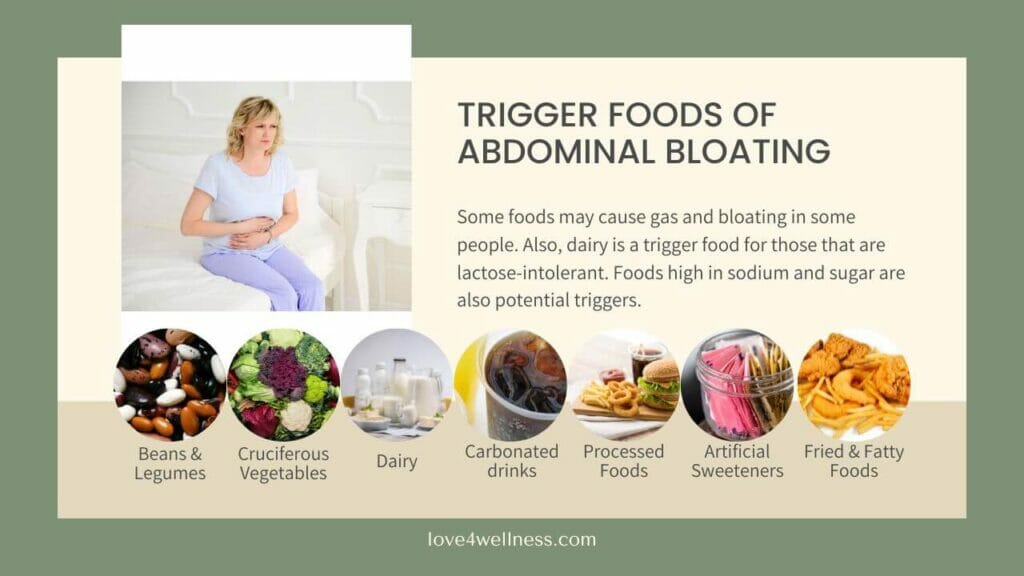A puffy tummy is a common problem for many of us. The reason can be poor digestion, approaching periods, stress or, of course, a medical condition. When your abdominal bloating is not due to a medical condition, there’s a sigh of relief because there are easy ways to reduce bloating, including the right dietary habits, a healthy lifestyle, yoga, etc.
Abdominal bloating is a common condition that causes the belly to feel full, tight, and swollen. It is often accompanied by discomfort or pain, a sense of fullness, and sometimes, gas and burping.
Feeling so bloated end of the day and completely fine the next morning or constipated for a few days with abdominal bloating are all examples of bloating that isn’t serious. And they get better faster with some lifestyle changes.
So what do you do to prevent or get rid of temporary abdominal bloating? First, you need to understand the trigger. It may be the food you ate, your menstrual periods, or your sedentary lifestyle.
Trigger foods to avoid to prevent abdominal bloating
If you know that the trigger is food, then avoiding foods that may cause gas and bloating is the effective way to prevent bloating.
Beans and legumes
These foods contain high amounts of fibre, which can be hard for some people to digest, leading to gas and bloating.
**Beans and legumes are good vegetarian dietary sources of protein. So, if you doubt bloating is due to these foods, reduce the intake quantities, but don’t strike them off your diet.
Cruciferous vegetables
Broccoli, cauliflower, and cabbage are high in raffinose, which can cause gas and bloating when taken in large amounts.
** Please note cruciferous veggies may cause bloating only when consumed in large quantities. So, do not avoid them completely but consume them in moderation. They provide several health benefits, including high phytoestrogens and beneficial gut bacteria effects.
Dairy products
If you are lactose-intolerant, you may suffer from bloating, gas, and diarrhoea after consuming dairy products. This is because the body cannot digest lactose, the sugar found in milk.
Carbonated beverages
Carbonated drinks such as soda and sparkling water release gas into the digestive system, leading to bloating and discomfort.
Processed foods
Highly processed foods like chips, crackers, and packaged snacks contain high amounts of sodium, which can cause water retention and bloating.
Artificial sweeteners
Artificial sweeteners such as sorbitol, xylitol, and mannitol are commonly found in sugar-free gum, other sugar-free products, and many processed foods like crackers. These sweeteners are difficult to digest and can cause bloating and gas.
Fried and fatty foods
Fried and fatty foods such as French fries, fried chicken, and pizza are high in fat and can take longer to digest. This can cause bloating, gas, and discomfort, especially if consumed in large quantities.
Tips to reduce abdominal bloating
Constipation, indigestion and stress are other common triggers causing abdominal bloating. The following are some tips that can help deflate your tummy.
1. Drink plenty of water
Excessive sodium from foods such as processed foods can lead to water retention, causing bloating. Staying hydrated can reduce fluid retention by helping flush out excess sodium from the body. Further, drinking water helps relieve constipation.
2. Eat slowly
Eating too quickly could cause you to swallow air, contributing to bloating. So, take your time to chew your food thoroughly. Also, chewing well helps your body absorb nutrients effectively.
3. Avoid chewing gum
Chewing gum can also make you swallow air, leading to bloating.
4. Exercise regularly
Exercise can help improve indigestion and constipation, both of which can contribute to bloating. Try incorporating physical activity into your routine, even if it’s just a short walk after a meal. Also, regular exercise may improve pre-menstrual symptoms, including bloating.
5. Try digestive aids
Over-the-counter digestive aids like probiotics, digestive enzymes, and ginger can help reduce bloating.
6. Manage stress
Stress can contribute to digestive problems, including bloating. Try to manage stress through relaxation techniques like deep breathing, yoga, or meditation.
7. Consider probiotics
Probiotics are live bacteria that can help promote healthy gut bacteria and aid digestion. Go for natural probiotics such as yogurt and kefir instead of store-bought ones.
Yoga poses to help relieve bloatedness
Ardha Matsyendrasana to ease pre-menstrual abdominal bloating
According to Yoga Journal, Ardha Matsyendrasana is a very effective yoga asana to reduce and relieve abdominal bloating.
Statistics say that about 73% of menstruating women experience gastrointestinal symptoms, including poor digestion and abdominal bloating.
Hence, this asana is particularly useful for women experiencing abdominal bloating before the onset of periods (pre-menstrual syndrome).
Also known as the half lord of the fishes pose, this twisting pose gently works the abdominal muscles enabling good digestion and reducing abdominal bloating.
Other asanas effective in reducing the bloated feeling are:
- Dhanurasana or the Bow pose
- Bharadwajasana
- Ustrasana or the Camel pose
- Marichyasana
- Viparita Karani or Legs-up-the-wall pose
When to see a doctor?
Are you not seeing significant relief despite dietary changes and adopting a healthy lifestyle? Then please consider seeing a doctor if your abdominal bloating is persistent, severe, or accompanied by other symptoms such as:
- Severe pain
- Diarrhoea or constipation
- Vomiting
- Fever
- Blood in the stool
- Unintentional weight loss
- Shortness of breath or difficulty breathing
These symptoms may indicate a more serious underlying condition, such as an intestinal blockage, infection, or inflammation. Getting a professional medical evaluation and proper diagnosis is always better to avoid complications.
A word from Love4wellness
Adopting a healthy lifestyle, including nutritious food, regular exercise, and yoga, are proactive measures to prevent abdominal bloating. Further, if your intolerance to certain foods triggers abdominal discomfort, it is best to maintain a food journal and avoid the triggers.
Also, it’s worth noting that bloating can be a symptom of more serious conditions, such as intestinal infection, irritable bowel syndrome (IBS) or inflammatory bowel disease (IBD), so if you experience frequent or severe bloating, you should consult a healthcare provider.
Images: canva.com



